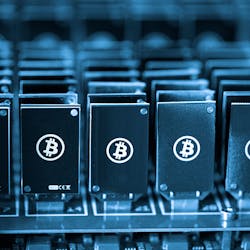Have you heard about 'blockchain technology?' How about 'Bitcoin?'
"I've talked with transportation executives about blockchain and they say, 'I've never heard of that before.' Then you say, 'Are you familiar with Bitcoin?' and they say, 'Yeah, isn't that the currency that drug dealers use to do transactions?' The easy answer is 'Yes,' but the more complex answer is that it has applications with far broader impact than just the illicit economy," says Andy Schmahl, partner with PwC's Strategy&.
Blockchain technology grew out of the Bitcoin system and is the method used to verify a Bitcoin's validity – where it was mined, where it was traded and where it ended up. Instead of a single digital document between two parties attesting to the currency's provenance, each transaction is composed of many transaction data blocks from multiple people who handled that bitcoin which are chained together for everyone to see. Now, this technology has gone beyond currency exchange.
In short, a blockchain is a distributed database that is updated in real time, stored in decentralized locations and easy to monitor. It has a level of security that insures that no person can cover up a mistake by changing a database entry, because, in a sense, everyone is watching. Blockchains are ledgers that are open to anyone in a transaction. In transportation, it might include a manufacturer, customs agents, shippers, government regulators, carrier and drivers. A chain may even go back as far as the raw materials used to produce goods.
This four-minute video from IBM explains how blockchain works.
No carriers contacted have a blockchain program in place although several said they've heard and read about it. However, it's only a matter of time before they're instituted, because the system can save money, time, and keep carriers and drivers out of trouble. (Maersk the world’s largest shipping company, working with IBM, has just completed a test of managing the company's cargos using blockchain. Walmart is also testing blockchain technology for its supply chain.)
"I see blockchain as one way for carriers to protect themselves, to officially hand off goods to the next person in the supply chain," says Jim Hayden, executive vice president of products at Savi Technology. "One of the main things you get in this ledger is who touched it, who are the carriers, who are the suppliers, who is the plant making finished goods." He adds: "Blockchain can help carriers when it comes to damaged goods. I think if both parties can certify that when the goods were transferred there was no damage. That could help carriers on insurance; it can help them on paying fees for being damaged or late. They can prove that they were there on time rather than just relying on the recipient’s word for it."
Hayden says his company focuses on sensors which produce data that can feed a data block. "It's the environmental side of things that we care about, things like electronics components experiencing a 'shock.' [A shock may include a sudden change in temperature, a damaging physical jolt or even a theft.] Every time one of our sensors identifies a shock event, it can then create a block chain entry into that ledger and say at this point in time 'here’s who had it, here’s the time stamp, here’s the location, and here’s the shock registered.' This can help determine where things went bad in the supply chain.
"Blockchain can lead to is 'disintermediation,' he adds."We don’t need the middleman anymore. Transactions can be validated around the globe. We don’t need a central bank to clear our transactions, or any type of clearing agency for that matter," Hayden says.
What's the future of blockchain technology in transportation?
For carriers that are hauling from Point A to Point B, blockchain has some value but not that much, says Schmahl.
"But in a world in which there are multiple parties involved with moving a product to many points, it becomes much more powerful," he says. "Blockchain is often referred to as a 'trustless network,' meaning trust is not required to prove the validity of transactions that. Blockchain envisions a system, that, because of the multiple parties involved in verifying some of the transactions, because of the technology that allows for more seamless interaction on non-proprietary systems you could have a situation where you're having your cake and eating it, too. It offers shorter processing times, higher degrees of verifiability, more interoperability among different systems and different players, oftentimes players that previously had been unaware of each other."
For example, a carrier may not have a relationship with a shipper or manufacturer until they're part of a blockchain. This visibility could open up new partnerships that they hadn't known about.
Drivers will have an important role in the blockchain, too, as they add their own data, often automatically, such as times on and off duty, the condition of roads, condition of the load and vehicle. It also can help them in disputes with shippers or their own carriers about when and where an event, such as a crash or goods damage occurred. It might bolster their opinion about unsafe vehicles or those that require repairs.
Although he was not available for an interview, Tom Kroswek, Group Director of Supply Chain Excellence at Ryder suggested in a recent blog that blockchain technology could aid truck maintenance. He wrote: "Think of something as simple as a DVCR (Driver Vehicle Condition Report) that a driver populates before and after the completion of a trip. Currently this is a very paper intensive process that should convey the condition of transportation equipment to operations, safety and maintenance. If automated and incorporated into a blockchain, all of the inspection and maintenance information could travel with the equipment throughout its lifecycle. Verification of the inspections, maintenance performance records and recall information could all be part of this blockchain. It ultimately simplifies the asset management and utilization task."
Adds Schmahl: "We're at an early stage, and I don't think that it's advisable to say to anyone, 'Hey, if you don't have your fully-formed blockchain strategy then you are toast.' But if you're an organization that is considering emerging, disruptive technologies like artificial intelligence, machine learning, and autonomous vehicles, then blockchain should absolutely be one of those things on your radar as potentially beneficial in smoothing out transaction frictions. But it could also be potentially disruptive if you rely on longstanding relationships with customers that revolve around trust [that you've nurtured]. Trust is a really big part of your value to customers and to your supply chain partners [and newcomers may enjoy that same trust immediately with blockchain.] "
"A fair amount of people are in a wait-and-see mode,” Hayden concludes. “But what is very interesting to us is this combination of the internet of things and block chain, where more intelligence is being put out at the edge and sensors add transactions to the block chain. It’s like having a person in a remote location for you."
About the Author

Larry Kahaner
Larry Kahaner is an author, journalist, and former FleetOwner contributor.


